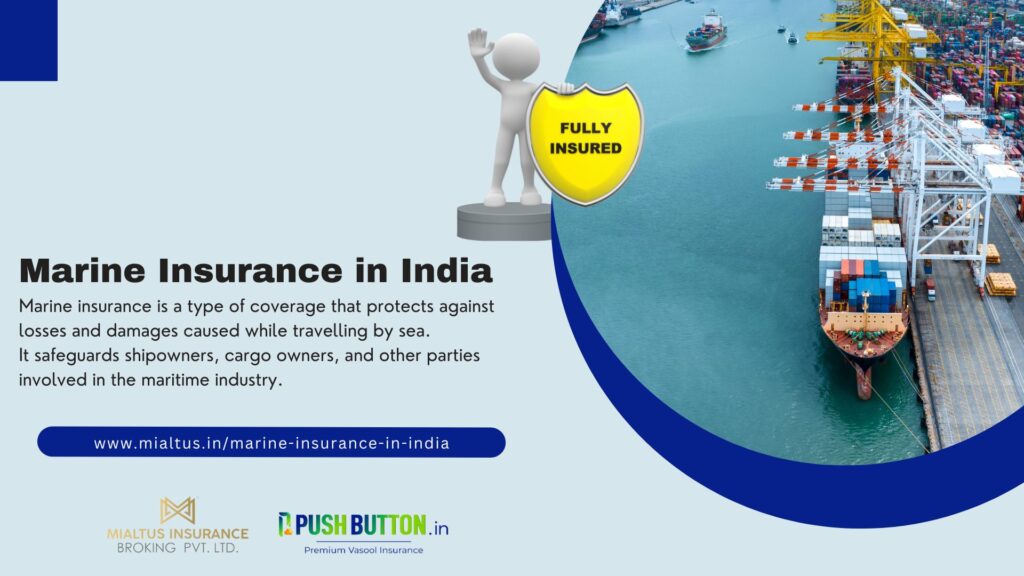
Marine insurance is a type of coverage that protects against losses and damages caused while traveling by sea. It safeguards shipowners, cargo owners, and other parties involved in the maritime industry. Marine insurance has been an essential component of global trade for centuries, and it is no different in India. The Indian marine insurance market has a long history dating back to the nineteenth century. This article will dig deeper into the world of marine insurance in India, discussing its various types, features, claim process, and regulatory framework.
The Importance of Marine Insurance in India
Marine insurance is critical to the Indian economy because the country is heavily reliant on sea trade. According to the Ministry of Shipping, the sea transports more than 90% of India’s trade by volume and 70% by value. The Indian coastline is also a popular tourist destination, with millions of people traveling by sea each year. Marine insurance makes sure that the risks of sea transportation are managed and that any losses or damages are compensated for.
Furthermore, marine insurance is required by Indian law. Every Indian ship is required to have a valid hull insurance policy; failure to comply can lead to penalties and even ship detention. Likewise, many countries require ships entering their ports to have valid marine insurance.
Types of Marine Insurance
Marine insurance in India is divided into the following categories:
- Hull Insurance: Physical damage to the ship and its machinery caused by perils such as storms, collisions, and fires is covered by hull insurance. It also covers the shipowner’s liability for third-party property or personal damage. The Merchant Shipping Act of 1958, which requires every Indian ship to have a valid insurance policy, makes hull insurance mandatory.
- Cargo Insurance: Cargo insurance protects the goods transported by sea from loss or damage. The cargo owner, shipper, or customer can purchase it. Cargo insurance can protect against a wide range of risks, including theft, damage, and loss caused by weather or accidents.
- Freight Insurance: This type of insurance protects the moving company against loss of transportation charges caused by cargo damage or loss.
- Liability Insurance: This type of insurance covers the shipowner’s or operator’s legal liabilities for third-party damages, such as collisions with other ships or damage to ports or other facilities.
Features of Marine Insurance in India
The following are the features of Marine Insurance in India:
- Voyage or Time Policies: Marine insurance policies can be voyage-specific or time-specific. Voyage policies cover a specific voyage, while time policies cover a specific time period, usually a year.
- Valuation: The valuation of the insured subject matter, such as the ship or cargo, is crucial in determining the premium and compensation in case of loss.
- Risk Coverage: Marine insurance policies in India cover various risks, including perils of the sea, piracy, war, and other maritime risks.
- Institute Cargo Clauses (ICC): These clauses define the risks covered by the policy and the compensation payable in case of loss or damage.
Marine Insurance in India Claim Process
The claim process for marine insurance in India typically involves the following steps:
- Notify the insurer: The insured must notify the insurer of any loss or damage as soon as possible. The notice should include the policy number, date and time of the loss, location, and nature of the loss or damage.
- Provide documents: The insurer will require documents such as the policy document, shipping documents, invoice, and any other relevant documents related to the loss or damage.
- Survey and inspection: The insurer will appoint a surveyor or inspector to assess the extent of the loss or damage. The surveyor or inspector will prepare a report and submit it to the insurer.
- Settlement of claim: Based on the surveyor’s report, the insurer will determine the amount of the claim and settle the claim accordingly.
- Dispute resolution: If there is any dispute regarding the settlement amount, the parties can resolve the dispute through arbitration or in court.
Regulatory Framework of Marine Insurance in India
The Insurance Regulatory and Development Authority of India (IRDAI) oversees the set of regulations for marine insurance in India. The IRDAI governs the operations of insurance companies in India, including marine insurers. Furthermore, the Indian Marine Insurance Act of 1963 establishes the legal foundation for marine insurance policies in India. The act defines insurers’ and insurance companies’ rights and responsibilities, as well as guidelines for claim settlement.
Conclusion
Finally, marine insurance is a critical component of India’s maritime industry. It protects shipowners, cargo owners, and other maritime trade participants against loss or damage. The Indian marine insurance market provides hull insurance, cargo insurance, freight insurance, and liability insurance. These policies differ in terms of voyage or time policies, valuation, and risk coverage. The IRDAI and the Indian Marine Insurance Act of 1963 govern the regulatory framework for marine insurance in India.


